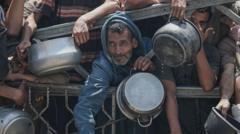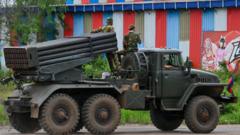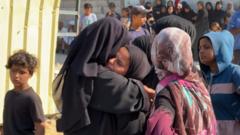As the ceasefire between Thailand and Cambodia faces significant challenges, tensions continue to rise following accusations of violations from both sides. The fragile agreement, intended to quell five days of violent confrontations, is met with skepticism and further unrest.
Ceasefire in Jeopardy: Thailand Accuses Cambodia of Violating Agreement

Ceasefire in Jeopardy: Thailand Accuses Cambodia of Violating Agreement
Tensions escalate as Thailand claims Cambodia violated a newly established ceasefire, amid ongoing border clashes.
In a dramatic turn of events, Thailand has accused Cambodia of "deliberately" breaching a ceasefire that had only recently been established following intense border skirmishes that have resulted in the deaths of at least 33 individuals and the displacement of thousands. The ceasefire, crafted to cease weeks of bombardment and rocket fire across the border, is witnessing a shaky beginning as each nation trades accusations.
Thailand's military reported that, despite halting all fire after midnight, it continued to receive gunfire from the Cambodian side at various locations. In contrast, Cambodia's defense ministry asserted to AFP that there had been "no armed clashes" since the ceasefire commenced. In a further sign of strain, a meeting between local commanders—which was part of the ceasefire conditions—has been postponed for a second time and may not occur at all.
The long-standing disputes over the shared border, often referred to as a century-old issue, intensified recently following the killing of a Cambodian soldier in a clash last May. These tensions escalated into broader conflict last week, when five Thai soldiers were injured due to a landmine explosion. In response, Thailand implemented measures such as closing certain border crossings, expelling the Cambodian ambassador, and recalling its own diplomatic personnel.
On Thursday, a violent exchange of gunfire occurred before Cambodia retaliated with rocket fire into Thailand, resulting in civilian casualties on both sides and prompting the evacuation of tens of thousands to safer locations. Despite these developments, Cambodian Prime Minister Hun Manet claimed the "frontlines have eased" since the ceasefire took effect at midnight.
This ceasefire agreement emerged from a meeting between Prime Minister Manet and Thailand's Phumtham Wechayachai, facilitated by Malaysian leader Anwar Ibrahim. Cambodia, feeling outmatched, pushed for the ceasefire, while Thailand initially hesitated to engage in negotiations until U.S. President Donald Trump intervened, threatening to halt tariffs until hostilities ceased.
The roots of the conflict trace back over a century, linked to territorial disputes arising after the colonial era. Hostilities ramped up notably in 2008 when Cambodia attempted to register an ancient temple located in the contested area as a UNESCO World Heritage Site, provoking outrage in Thailand and reigniting clashes.
In the wake of recent events that have seen both nations impose border restrictions on each other, including Cambodia's bans on Thai imports and services, the situation remains precarious. The presence of troops at the border has increased dramatically in recent weeks, reflecting the uncertainty and volatility of the ongoing tension between the two Southeast Asian nations.
Thailand's military reported that, despite halting all fire after midnight, it continued to receive gunfire from the Cambodian side at various locations. In contrast, Cambodia's defense ministry asserted to AFP that there had been "no armed clashes" since the ceasefire commenced. In a further sign of strain, a meeting between local commanders—which was part of the ceasefire conditions—has been postponed for a second time and may not occur at all.
The long-standing disputes over the shared border, often referred to as a century-old issue, intensified recently following the killing of a Cambodian soldier in a clash last May. These tensions escalated into broader conflict last week, when five Thai soldiers were injured due to a landmine explosion. In response, Thailand implemented measures such as closing certain border crossings, expelling the Cambodian ambassador, and recalling its own diplomatic personnel.
On Thursday, a violent exchange of gunfire occurred before Cambodia retaliated with rocket fire into Thailand, resulting in civilian casualties on both sides and prompting the evacuation of tens of thousands to safer locations. Despite these developments, Cambodian Prime Minister Hun Manet claimed the "frontlines have eased" since the ceasefire took effect at midnight.
This ceasefire agreement emerged from a meeting between Prime Minister Manet and Thailand's Phumtham Wechayachai, facilitated by Malaysian leader Anwar Ibrahim. Cambodia, feeling outmatched, pushed for the ceasefire, while Thailand initially hesitated to engage in negotiations until U.S. President Donald Trump intervened, threatening to halt tariffs until hostilities ceased.
The roots of the conflict trace back over a century, linked to territorial disputes arising after the colonial era. Hostilities ramped up notably in 2008 when Cambodia attempted to register an ancient temple located in the contested area as a UNESCO World Heritage Site, provoking outrage in Thailand and reigniting clashes.
In the wake of recent events that have seen both nations impose border restrictions on each other, including Cambodia's bans on Thai imports and services, the situation remains precarious. The presence of troops at the border has increased dramatically in recent weeks, reflecting the uncertainty and volatility of the ongoing tension between the two Southeast Asian nations.

















